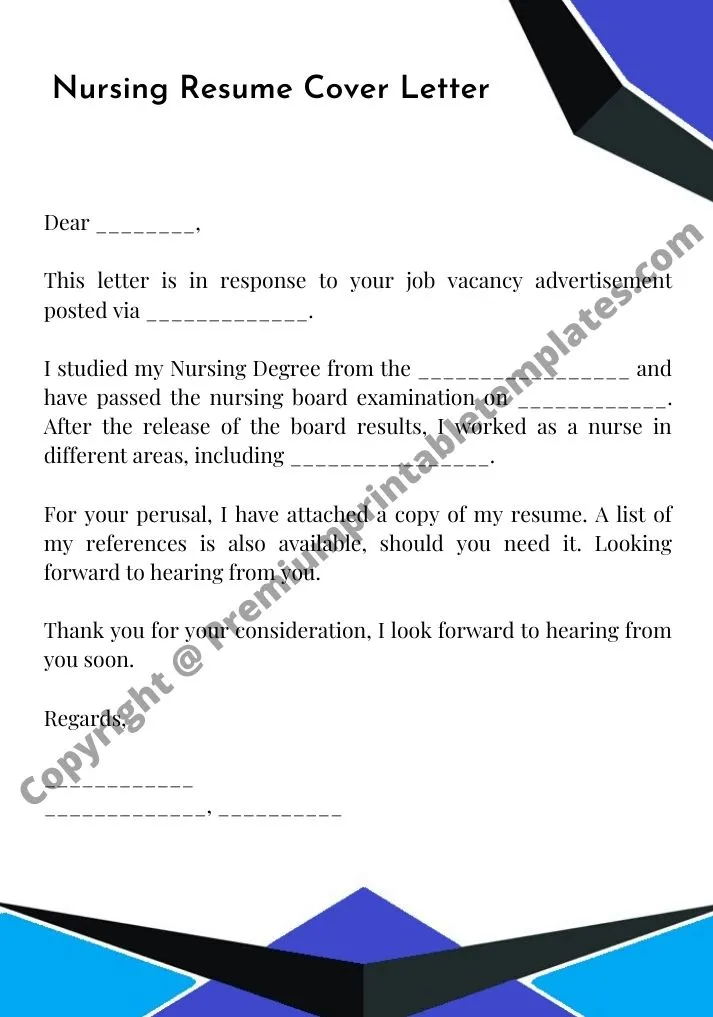Nursing Cover Letter Secrets
A compelling nursing cover letter is your first opportunity to make a strong impression on a potential employer. It’s more than just a formality; it’s a crucial tool that can significantly increase your chances of landing an interview. In the competitive field of nursing, a well-crafted cover letter allows you to showcase your unique skills, experience, and passion for patient care, setting you apart from other applicants. This guide will uncover the secrets to writing a cover letter that grabs attention and opens doors to exciting nursing opportunities. Discover the essential elements, formatting tips, and common pitfalls to avoid, empowering you to create a cover letter that truly represents your capabilities and career goals. Remember, a great nursing cover letter is not just about listing qualifications; it’s about telling your story and demonstrating why you are the perfect fit for the role and the healthcare organization.
Understanding the Importance of a Nursing Cover Letter
In the realm of nursing, a cover letter serves as your personal introduction, offering a glimpse into your professional journey beyond the concise details of your resume. It’s the space where you can express your personality, enthusiasm, and the specific reasons you’re drawn to the nursing position and the healthcare facility. Think of your resume as the ‘what’ – your skills, experience, and qualifications – and your cover letter as the ‘why’ – why you’re passionate about nursing, why you chose this specific career path, and why you’re the best candidate for the job.
Why a Cover Letter Matters
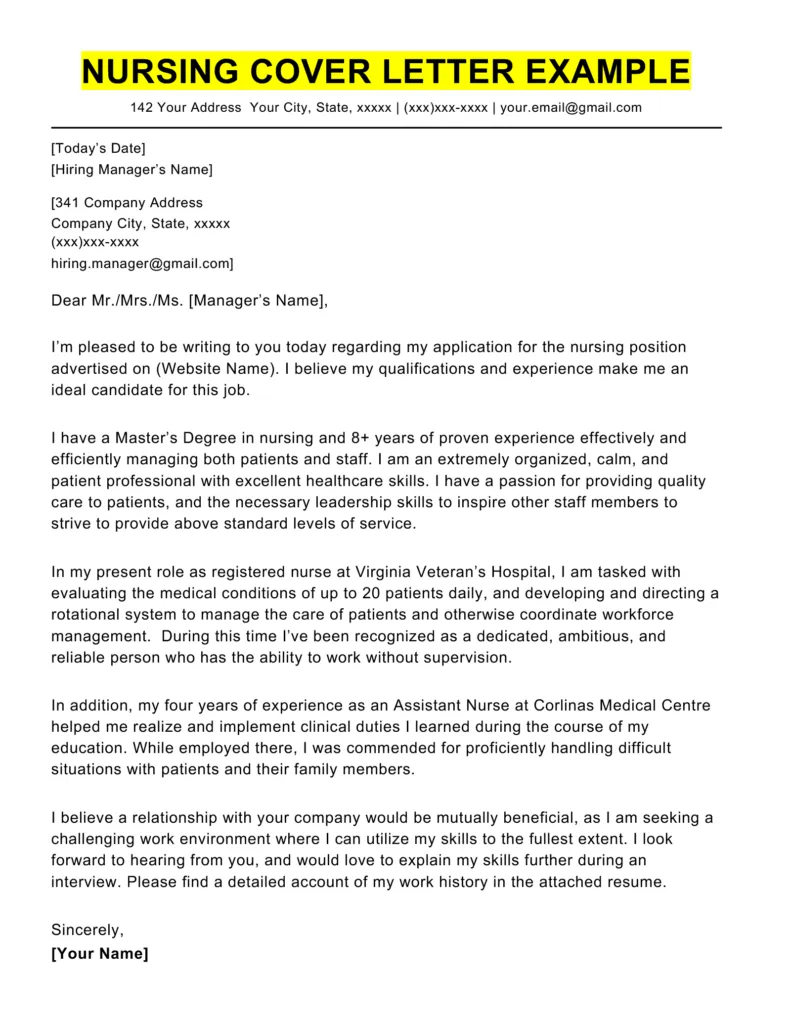
A well-written nursing cover letter can set you apart. It provides an opportunity to explain any career transitions, address gaps in your employment history, or highlight specific accomplishments. It lets you demonstrate your understanding of the organization’s mission and values, and how your skills align with their needs. The cover letter shows the hiring manager your communication skills and attention to detail. It helps you build a rapport, showcasing your enthusiasm for the role and for providing patient care.
Cover Letter vs. Resume
While your resume is a factual overview of your career, your cover letter is your personal story. The resume focuses on your skills, qualifications, and work history, while the cover letter gives context to those facts, explaining why you are interested in the position and what you hope to achieve. Think of the resume as a comprehensive list of your credentials and the cover letter as the narrative that brings those credentials to life. Both are important, but they serve different purposes. One is a summary, the other is a sales pitch.
Essential Elements of a Nursing Cover Letter
Header and Contact Information
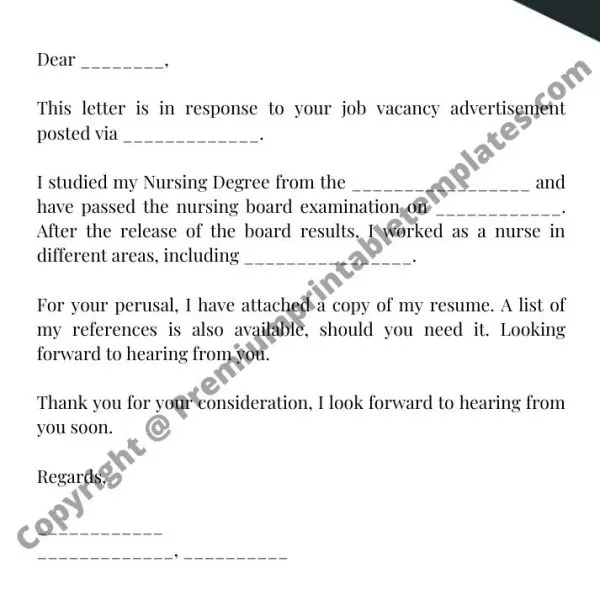
Start with a professional header that includes your name, address, phone number, and email address. Also, include the date and the hiring manager’s name and title, if known. If you can’t find the hiring manager’s name, you can use the department head or the title of the person who will be reviewing applications. Ensuring your header is accurate and professional sets the tone for the rest of the letter, demonstrating attention to detail and professionalism.
Professional Greeting
Address the hiring manager by name whenever possible. This personalized approach immediately grabs attention and shows that you’ve taken the time to research the organization. Using a generic greeting like ‘To Whom It May Concern’ makes your application feel impersonal and less likely to stand out. If you don’t know the hiring manager’s name, try contacting the HR department to find out.
Highlighting Your Skills and Experience
This is your opportunity to showcase your most relevant skills and experiences. Review the job description carefully and identify the key requirements. Then, provide specific examples of how you’ve demonstrated those skills in your previous roles. Use action verbs to describe your accomplishments and quantify your achievements whenever possible. Consider using the STAR method (Situation, Task, Action, Result) to structure your examples effectively. This method helps you provide a clear and concise explanation of your accomplishments and how they benefited your previous employers.
Tailoring Your Cover Letter
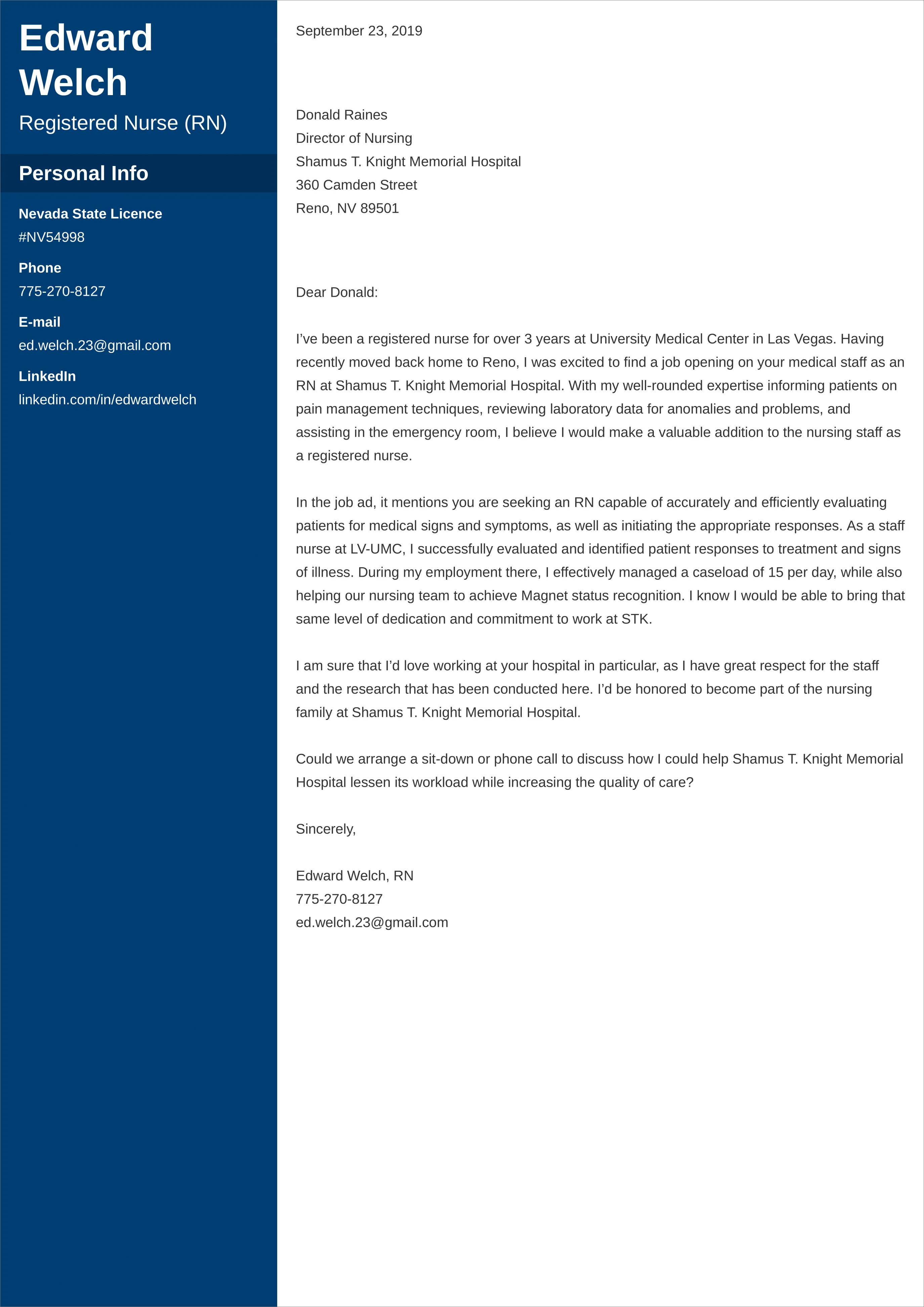
Each nursing position is unique, so tailor your cover letter to match the specific requirements and the needs of the employer. This is not a one-size-fits-all document. Review the job description and identify the key skills, experience, and qualities the employer is seeking. Use these keywords and phrases throughout your cover letter to demonstrate that you possess the specific attributes they’re looking for. This targeted approach shows your interest and that you have the desired qualifications.
Quantifying Your Achievements
Numbers can significantly strengthen your cover letter. Instead of just stating that you ‘provided excellent patient care’, quantify your achievements. For instance, ‘Reduced patient fall rates by 15% in six months’ or ‘Consistently managed a caseload of 10-12 patients daily with a high degree of accuracy’. These concrete examples give the hiring manager a clear picture of your capabilities and the impact you can make. Numbers demonstrate not just what you did, but how well you did it.
Demonstrating Passion and Fit
Expressing your passion for nursing and explaining why you are interested in the specific role or organization is a critical step. Describe what interests you about this particular position, why you’re excited about the opportunity, and how your values align with the healthcare organization’s mission. Mentioning specific programs, initiatives, or aspects of the organization’s culture can demonstrate your sincere interest and suitability.
Closing and Call to Action
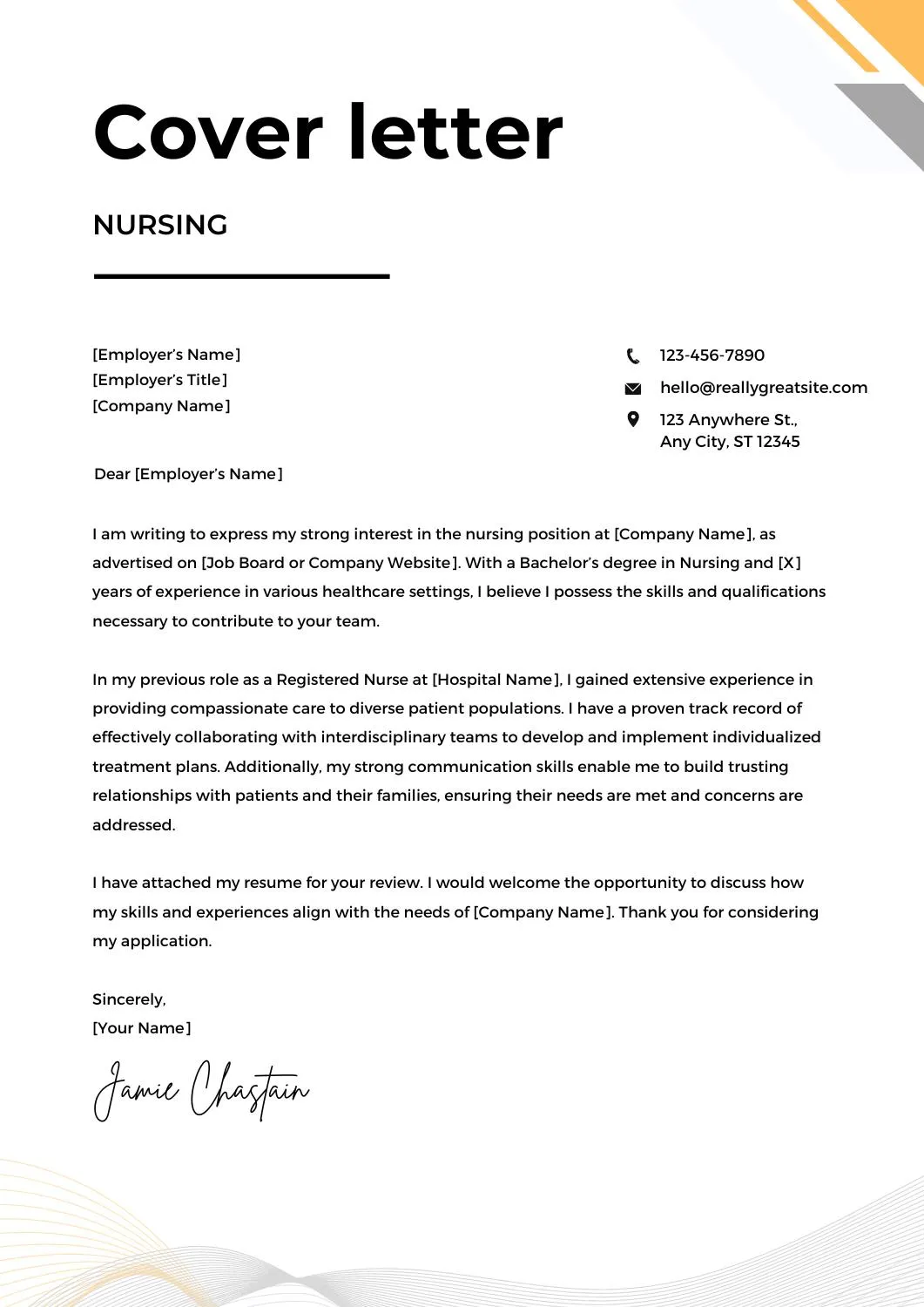
Conclude your cover letter with a confident closing statement, reiterating your interest in the position. Thank the hiring manager for their time and consideration and clearly state your availability for an interview. Provide your contact information and express your eagerness to discuss your qualifications further. A strong call to action ensures you’re actively pursuing the opportunity and allows the hiring manager to take the next step with ease.
Formatting and Design Tips for your Cover Letter
Choosing the Right Font
Select a professional and easy-to-read font, such as Times New Roman, Arial, or Calibri. These fonts are widely recognized as clear and accessible, ensuring your cover letter is readable and easy to follow. Keep the font size between 10 and 12 points. Avoid overly decorative or unusual fonts, as they can distract from the content of your letter. Also, be consistent with your font choice throughout the entire document.
Formatting and Layout
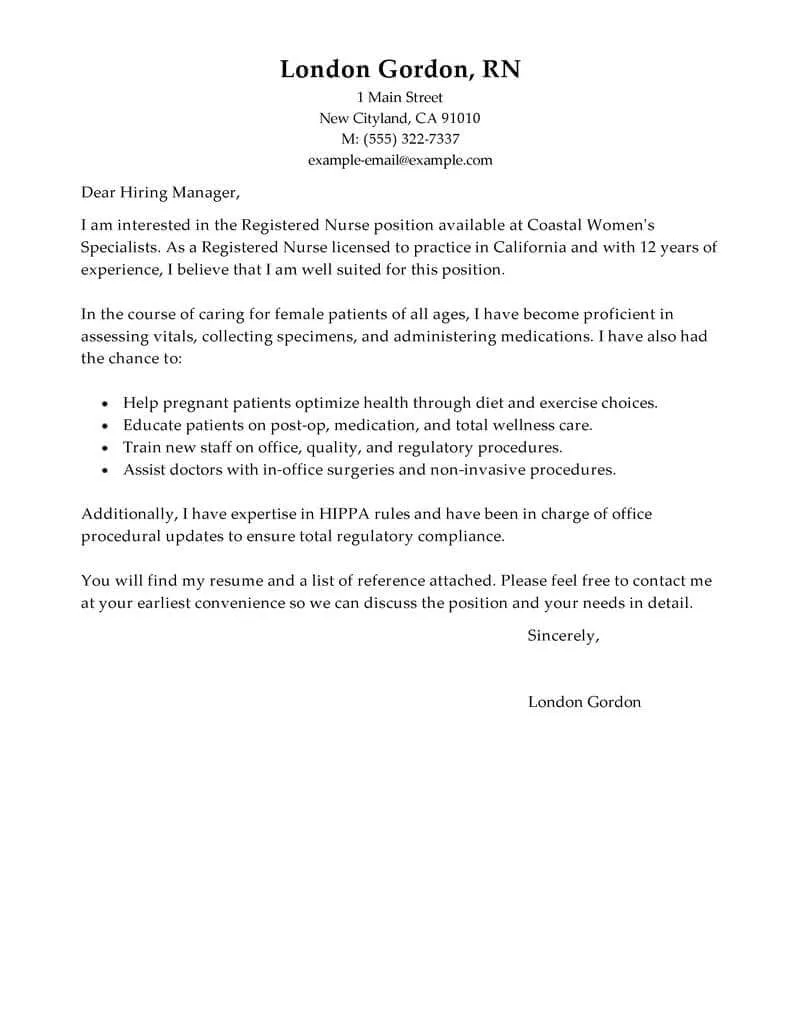
Use a clean and organized layout with clear headings and ample white space. Keep the margins at 1 inch on all sides. Use bullet points to highlight your skills and achievements and make the information easier to scan. Ensure your cover letter is no more than one page long, as hiring managers often have limited time to review each application. A well-formatted letter is easier to read and more likely to leave a positive impression.
Proofreading and Editing
Proofread your cover letter multiple times for any grammatical errors, typos, or inconsistencies. Ask a friend or colleague to review your letter as well. A fresh pair of eyes can often catch mistakes that you might miss. A polished and error-free cover letter shows your attention to detail and professionalism, increasing your chances of being selected for an interview. Always ensure the language is clear, concise, and free of jargon.
Common Mistakes to Avoid in Nursing Cover Letters
Generic Cover Letters
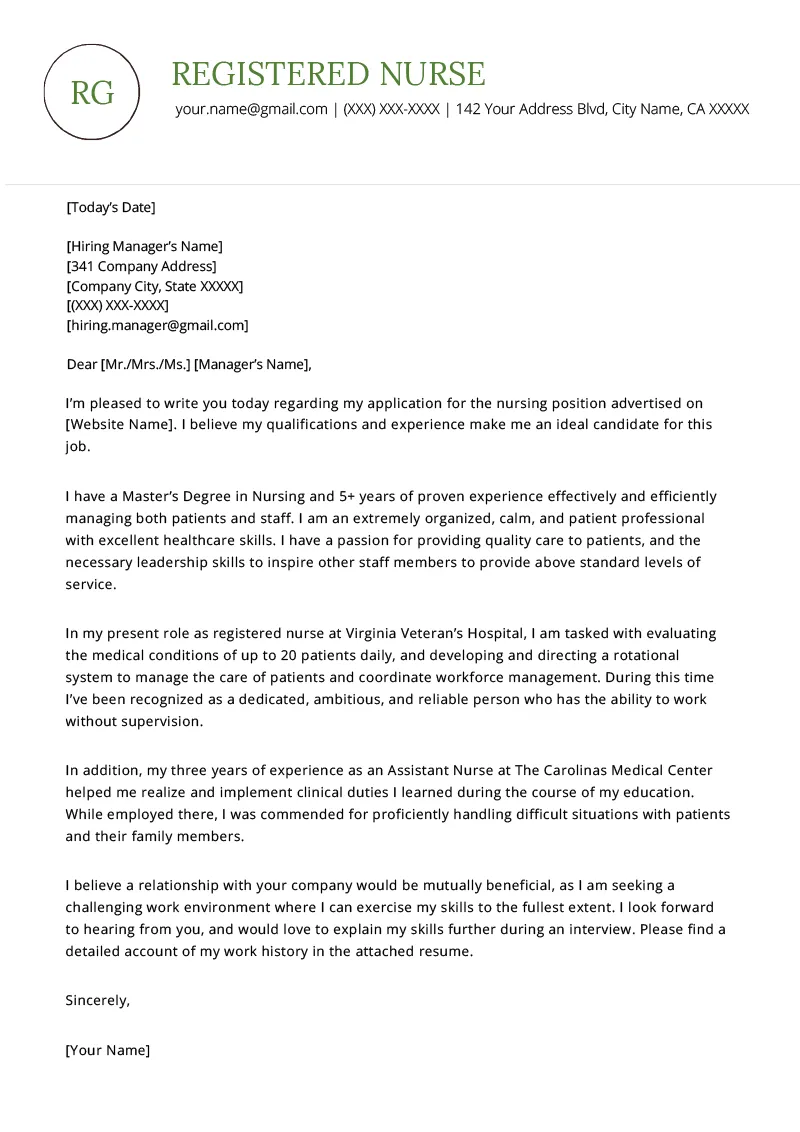
Sending a generic cover letter that is not tailored to the specific job or organization is a major mistake. Such letters show a lack of effort and indicate that you may not be genuinely interested in the position. Always customize your cover letter to the specific role, highlighting the skills and experience that align with the job requirements. Research the organization and demonstrate how your goals align with theirs.
Focusing Solely on Job Duties
Avoid merely listing your job duties in your cover letter. Instead, focus on your accomplishments and the impact you made in previous roles. Explain how you went above and beyond your basic responsibilities to provide exceptional patient care or improve healthcare outcomes. Quantify your achievements whenever possible. Give specific examples to bring your experiences to life and make a more compelling case.
Typos and Grammatical Errors
Typos and grammatical errors can damage your credibility and show a lack of attention to detail. Proofread your cover letter multiple times before submitting it. Use a grammar checker and ask a friend or colleague to review your letter for any errors. A polished and error-free cover letter shows you take your application seriously and are professional, enhancing your chances of making a positive impression.
Additional Resources for Cover Letters
Sample Nursing Cover Letters
Use sample nursing cover letters as guides to understand the general format and content. Numerous online resources and career websites offer examples. Tailor these samples to your specific skills, experience, and the job you are applying for. Do not copy the samples verbatim, because this will be detected by the hiring manager. Adapt the ideas and structure to fit your personal experience, making your cover letter unique.
Cover Letter Templates
Utilize cover letter templates to save time and ensure a professional layout. Many websites offer free and paid templates. Templates provide a framework for your letter, including the proper formatting and structure. Customize the template with your information, making sure it reflects your personality and the requirements of the job. Make sure the template is compatible with the job description and that it is not too generic.
Seeking feedback from a professional
Seek feedback on your nursing cover letter from a career counselor or a trusted colleague. They can provide valuable insights into the effectiveness of your letter, pointing out any areas for improvement. They can review your letter for clarity, grammar, and overall impact. A second opinion can help you refine your cover letter and ensure that it accurately reflects your skills and experience. Make the necessary adjustments to make the most compelling impression.
